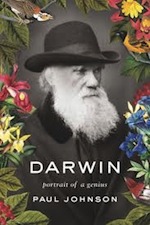 Culture & Ethics
Culture & Ethics
 Evolution
Evolution
Darwinism and Stalinism, Cont.
 In the strange netherworld of Internet Darwinists, the blogger Sensuous Curmudgeon wins a prize for strained humor and a unique adenoidal shrieking quality. Better-known Darwin activists occasionally look to him as a source of news and analysis. (You can’t make this stuff up.) The Curmudgeon took note of Michael Flannery’s comments here on “Darwinism and Stalinism,” a continuation of Mike’s review of Paul Johnson’s recent book Darwin: Portrait of a Genius.
In the strange netherworld of Internet Darwinists, the blogger Sensuous Curmudgeon wins a prize for strained humor and a unique adenoidal shrieking quality. Better-known Darwin activists occasionally look to him as a source of news and analysis. (You can’t make this stuff up.) The Curmudgeon took note of Michael Flannery’s comments here on “Darwinism and Stalinism,” a continuation of Mike’s review of Paul Johnson’s recent book Darwin: Portrait of a Genius.
Among other things, the Curmudgeon had this to say (“Discovery Institute: Beyond Despicable“): “As we pointed out in ‘Marx, Stalin, and Darwin,’ Stalin opposed Darwin’s theory. This man, not Darwin, was Stalin’s biologist: Trofim Denisovich Lysenko, and Lysenko was definitely an anti-Darwinian.”
It may be worth pointing out that this is completely false. Modern Darwinists like to compare intelligent design to Lysenkoism, claiming that Trofim Lysenko persecuted Darwinists because he was a Lamarckian and thereby set back biological science in the Soviet Union. These same Darwinist claim that ID now poses a similar threat, implying that ID proponents persecute (or would like to persecute) Darwinists.
But Darwin’s Origin of Species included Lamarckian elements — it cited use and disuse as one cause of new variations — and the conflict in the 1930s was not between Darwinism and Lamarckism but between Darwinism and Mendelism. Lysenko was pro-Darwin but anti-Mendel, and it was the Mendelians he persecuted with Stalin’s backing. (As we know, also, it is the Darwinists who now persecute ID proponents, not vice versa.)
See the two paragraphs (with notes) below from Jonathan Wells, Chapter 16 (“American Lysenkoism”), The Politically Incorrect Guide to Darwinism and Intelligent Design (Regnery, 2006), p. 185:
Lysenko had little formal training in biology, much less Mendelian genetics. He also initially denied any kinship between his ideas and Lamarckism, but after Isaak Prezent, president of the Society of Marxist Biologists, introduced him to evolutionary theory he eagerly embraced Darwinism — along with its Lamarckian elements. By the 1930s, Lysenko was conflating the physiological process of vernalization* with the Lamarckian inheritance of acquired characteristics. When Mendelian biologists criticized him, he simply evaded their arguments and declared that Mendelian genetics was unacceptable because it contradicted Darwinian evolution.11
By then, many Western biologists were accepting the “modern synthesis” of Darwinian evolution and Mendelian genetics, but Soviet Minister of Agriculture Jakov Jakovlev supported Lysenko by declaring Mendelism to be incompatible with true Darwinism. In 1937, Prezent praised Lysenko for “marching… under the banner of reconstruction of biological science on the basis of Darwinism raised to the level of Marxism,” while he demonized the Mendelians as “powers of darkness.”12
*Vernalization is a treatment Lysenko promised would increase productivity by making it possible to sow winter grain in the spring. It never lived up to its promise.
Notes:
(11) Nils Roll-Hansen, The Lysenko Effect: The Politics of Science (Amherst, NY: Humanity Books, 2005), pp. 86-89. Valery N. Soyfer, Lysenko and the Tragedy of Soviet Science (New Brunswick, NJ: Rutgers University Press, 1994), Chapters 1,2 and Conclusion. David Joravsky, The Lysenko Affair (Cambridge, MA: Harvard University Press, 1970), pp. 208, 238-239. Zhores Medvedev, The Rise and Fall of T. D. Lysenko (New York: Columbia University Press, 1969), Chapter 3.
(12) Roll-Hansen (2005), pp. 218-220. Medvedev (1969), pp. 46-49.
